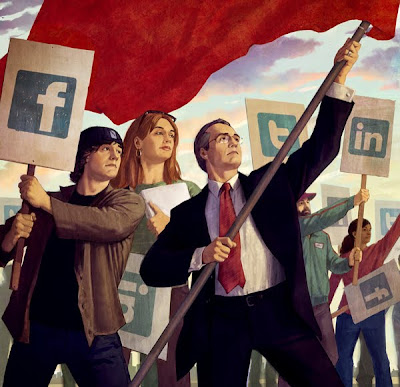It is becoming more popular now as it makes life easy or perhaps for convenience sake if not just show off. The first time I experienced it was at church service when the Priest asked everyone to open their bibles but realised few church members pulling their mobile phones from their purse and pocket. Interestingly, one old folk tapped the shoulder of a young lady who had a phone and then pointed his hand to the notice “Kindly switch off your mobile phone, thank you.” The old folk stared astonishingly after the lady whispered quietly “it has a bible”. On Palm Sunday, the Priest used an IPad for his sermon, prayers and bible readings. A few years back this would have been entirely impossible.
“He is not poking back my pokes after leaving the message on his wall, I wish I didn’t tag him on that album” – “I followed his twits after googling his company’s name” – “facebooking is restricted during working hours, we mean business not pleasure”. If it was easy to understand the scenarios above, I guess you’re a 21st Century citizen, if not, why not? I believe you’re getting the point I’m trying to make now. The way we live our lives today has changed radically, leaving technology to take control of most of our time.
Time to check a quick email turns to hours on social media websites, if not on facebook. My grandmother would certainly agree with you about this change because even though she appreciate the fact that she can talk to us anytime through my uncle’s phone, she has no idea how this is possible. Possibility is what technology stands for.
Yes, we’re in the social media revolution, the digital age where uprising in our (physical) societies easily sparkle from the (virtual) internet. We’re in the knowledge age where the role of the teacher in the classroom is not just providing information but guiding and empowering students to be creative and innovative because most (if not all) information is available online.
Right, it’s quite obvious about the encroachment of technology in the 21st Century but keep in mind that not all nations or societies in the world are experiencing this paradigm shift. Therefore any attempt to revolt against the Chief in my hometown via facebook or twitter would not be only in vain but inconsequential. If you doubt, try! Many societies still live outside the system even though technology keeps travelling on a top speed.
Today, we need 21st Century leaders’ not just leaders leading in the 21st Century. We need leading experts in Change, Innovation and Strategy like Dr. Dave Richards, who is a globally successful senior executive, serial entrepreneur and intrapreneur, innovator, author, inspirational speaker, and advisor on strategic innovation and leadership - Desi Lopez Fafie, who is a highly capable business executive and leader, with excellent skills to build relationships and manage large groups of people with diverse cultural and linguistic backgrounds and has the eyes to unearth the potentials, opportunities and possibilities in the African continent (http://dfafie.wordpress.com) and John P. Kotter, a Professor of leadership, emeritus, at Harvard Business School, who is widely regarded as the world’s foremost authority on leadership and change (http://blogs.forbes.com/johnkotter/).
Just as social media has opened a dialogue between businesses and consumers, its value is apparent to those in political office, whose work and very professional survival hinges on the needs and perceptions of their constituents. But when was the last time a local politician garnered the same social media buzz as a hip start-up, or a savvy online retailer?
We need a government that embodies the paradigm shift of the 21st Century like President Barak Obama. There’s still an entire year and seven months until the U.S.
About three weeks ago, Mitt Romney had already announced his bid on Youtube. and Tim Pawlenty had already joined the race through his facebook page. President Obama also kicked off his re-election campaign with a number of digital initiatives.
President Obama continues to leverage IT leaders’ role to grow the American economy. No wonder he created the Chief Technology Officer position in his government, which Eric Schmidt (Executive Chairman, Google) was mentioned as a possible candidate.
Increased mobility, immigration, intermarriage, and access to job opportunities worldwide have led to another kind of blending and mixing-communities across the globe are becoming ever more culturally diverse in the 21st Century. Even though I’m not an American citizen, I concur the speech by President Obama on “Building a 21st Century Immigration System”. In his speech President Obama said, “…it doesn’t matter where you come from, doesn’t matter what you look like, it doesn’t matter what faith you worship, what matters is you believe in the ideals on which we were founded.”
The 21st Century challenge for each of us is to build and maintain our own identity from our given traditions and from the wide variety of traditions all around us. At the same time we should all learn to apply tolerance and compassion for the different identities and value of others.
With growing diversity of global traditions and values that now surrounds us, the challenge to maintaining social harmony is great, but the opportunities for richer, more creative, and vibrant communities are even greater.
That’s the way technology is affecting the way we live and work today.
Is this a paradigm shift? Your comments are welcome.
Thank you!
© Harry Tetteh
Profile: http://gh.linkedin.com/in/harrytetteh
Facebook: facebook.com/harry.tetteh
Twitter:http://twitter.com/harrykt
Skype: harrykt
Facebook: facebook.com/harry.tetteh
Twitter:http://twitter.com/harrykt
Skype: harrykt





